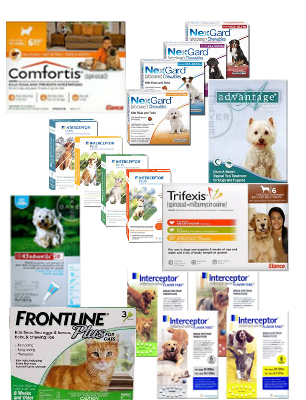Keeping your pet up-to-date on vaccinations and controlling both internal and external parasites will help to keep your pet feeling healthy.
Pet Vaccinations
Dog Vaccinations:
- DHLPP/DHPPC- This stands for “Distemper, Hepatitis, Leptospirosis, Parainfluenza, Parvo, Corona”; vaccine guards against all of the canine viruses listed; vaccine is given annually
- Corona – Guards against intestinal disease causing diarrhea and vomiting in dogs of all ages; vaccine is given annually
- Lepto – Guards against bacterial infection which could possibly lead to permanent kidney damage; vaccine given annually
- Bordetella – Protects against tracheobronchitis better known as kennel cough; given every six months
- CIV (Canine Influenza Vaccine)- Protects against or decreases the severity of Canine Influenza. The vaccine comes in either H3N2, H3N8, or bivalent forms (both together) and may be given to adult dogs and puppies over 8 weeks of age. As vaccines do not cross protect, we require vaccination against both strains for our canine guests. For pets receiving the vaccine for the first time, a booster must be given 3 weeks after the initial dose.
- Rabies – A puppy’s first rabies vaccine is a 1-year vaccine; after the initial 1-year vaccine, all other rabies vaccines are 3-year vaccines and are good for 3 years after the date they are given.
Puppy Vaccinations:
- DHLPP-DHPPC – The initial vaccine is given at 6 weeks of age or slightly there after and boostered every 3 weeks until the puppy is older than 16 weeks of age. The reason for this is that the puppy has the mother’s immunities when it is born. Researchers are not sure when the mother’s immunities fade and the puppy’s immunities “kick in.” It is known that by 16 weeks of age, a puppy’s immune system is its own. Therefore, puppies are vaccinated and boostered until 16 weeks of age in order to build their own immune system. Usually, puppies are vaccinated at 6, 9, 12 and 16 weeks of age.
- CIV (Canine Influenza)- Given to puppies over 8 weeks and requires a booster 3 weeks after the initial dose.
- Rabies vaccine (1 year vaccine) – given at 4 months of age
- Bordetella- given at 9 weeks of age or older
Cat Vaccinations:
- FVRCP – FVRCP stands for (Feline Virus) Rhinotracheitis, Calici Virus, Panleukopenia; protects against any of the feline viruses listed; vaccine is given annually.
- Feline Leukemia – Protects against the feline leukemia virus; this vaccine is given annually and is not required to board
- Rabies – A cat’s first rabies vaccine is a 1-year vaccine; after the initial 1-year vaccine, all other rabies vaccines are 3 years and are good for 3 years after the date they are given.
Kitten Vaccinations:
- FVRCP- FVRCP stands for (Feline Virus) Rhinotracheitis, Calici Virus, Panleukopenia; protects against the listed viruses. This vaccine is given every 2-3 weeks starting at 6 weeks of age. In older kittens, the vaccine needs to be given at least twice.
- Rabies- The initial Rabies vaccine is a 1 year vaccine and is given no earlier than 12 weeks of age and usually at 16 weeks.
Parasite Prevention
Heartworm Prevention
Animals should be tested for heartworms once a year. Heartworm testing is a simple blood test that can be done as part of an animal’s yearly physical. Heartworm preventative is STRONGLY recommended. Animals can be treated if they test positive for heartworms; however, animals must be confined for one month during treatment and treatment is very expensive. Heartworm preventative also guards against hookworms, roundworms, and whipworms. Spring Forest Animal Hospital sells the following heartworm preventative that is to be administered once a month by the owner.
- Interceptor Plus – (2-8lb, 8.1-25lb, 25.1-50lb, 50.1-100lb, >100lb doses)
Flea and Tick Preventative:
Spring Forest Animal Hospital sells the following Flea and Tick Treatment/Preventative:
- Advantix – Guards against fleas and ticks and repels mosquitoes; medication only penetrates the skin as deep as the hair follicle.
- Advantage – Guards against fleas only; medication only penetrates the skin as deep as the hair follicle
- Credlio – Guards against fleas and ticks
- Canine – Parting the animal’s hair between the shoulder blades and squeezing the medication directly onto the skin
- Feline – Parting the animal’s hair at the base of the skull and squeezing the medication directly onto the skin



